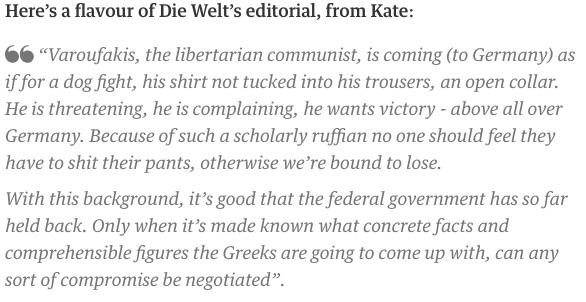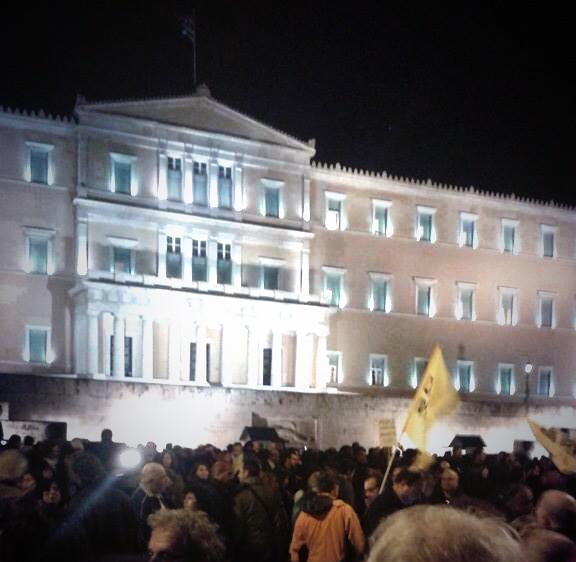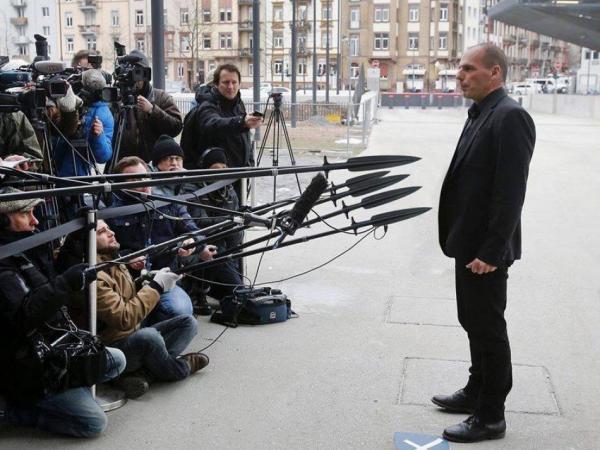Mother, who is 83 years old can't remember a *spontaneous* AND *pro-government* rally in her lifetime. In Greece, the barricades, the riot police -and the fear, are one
Eurogroup
Gives Greece 10 Day Ultimatum: Apply For Bailout Or Grexit
6
February, 2015
Update:
And now this:
- MOODY'S PLACES GREECE'S Caa1 GOVT. BOND RATING ON REVIEW FOR DOWNGRADE REVIEW
- GREECE CREDITOR TALKS UNCERTAINTY KEY DRIVER FOR MOODY'S REVIEW
- GREECE TALKS OUTCOME COULD BE NEGATIVE FOR FUNDING: MOODY'S
Surely
Greece must be delighted to be part of the European "Union"
at this point.
* *
*
Europe
has an unpleasant habit of dropping tape bombs at the most
inopportune of times, like at 3pm or later a Friday. And while on
Wednesday it was the ECB yanking repoable Greek collateral for local
banks, today it was first S&P, which downgraded Greece 5 months
after upgrading it, and moments ago it was none other than the Cyprus
bail-in man himself, the Eurogroup's Dijsselbloem, aka Diesel
"Blueprint" BOOM,
who just have Greece a 10 day ultimatum to fall into place or risk a
terminal bank run and capital controls (both hinted at earlier by the
post-DOJ settlement political "rating agency')
- GREECE MUST APPLY FOR BAILOUT EXTENSION ON FEB 16 AT THE LATEST TO KEEP EURO ZONE FINANCIAL BACKING -EUROGROUP CHAIRMAN DIJSSELBLOEM
This
means that Greece now has 10 days, or until the Monday after next to
decide whether it will stay in the Eurozone or Grexit. More
from Reuters:
[Yanis Varoufakis] made clear that the new government, which came to power on a wave of anti-austerity anger in elections last month, now wanted to forego remaining bailout money that had austerity strings attached:
"Greece is not asking for the remaining tranches of the current bailout programme - except the 1.9 billion euros that the ECB and the EU member states' central banks must return."
Euro zone finance ministers will discuss how to proceed with financial support for Athens at a special session next Wednesday ahead of the first summit of EU leaders with the new Greek prime minister, Alexis Tsipras, the following day.
However, the chairman of the finance ministers said the following meeting of theEurogroup on Feb. 16 would be Greece's last chance to apply for a bailout extension because some euro zone countries would need to consult their parliaments.
"Time will become very short if they (Greece) don't ask for an extension (by then)," said Jeroen Dijsselbloem.
The current bailout for Greece expires on Feb 28. Without it the country will not get financing or debt relief from its lenders and has little hope of financing itself in the markets.
* * *
Participants said no progress was made at a preparatory meeting of senior finance officials in Brussels on Thursday because Greece and its euro zone partners were so far apart.
"It was Greece against all others, basically one versus 18," one official said.
Almost
sounds like a reverse veto out of the European "Union".
At
the end of the day what D-Boom has effectively said is this:
Which
is precisely the thing Greece, whose negotiating position already has
been crushed with the threat of a wholesale bank run, did not want to
hear especially now that the government really has no choice: either
it complies with European demands, and can sign its resignation
right after having flopped epically, or it pushes on to find out just
how badly Europe is bluffing.
Suddenly
next week's emergency Eurogroup meeting on Wednesday is looking quite
fascinating. We hope the caterers have bulletproof jackets.
And
with that we give you... EUROPE!
Yanis Varoufakis retweeted
Having dealt personally with both #Schauble & #Varoufakis - if anyone’s a bully, its #Schauble Nasty Op-Ed from @welt
Greece’s Syriza government vows to fight pressure to stick to bailout terms
Eurozone
ministers to hold special debt talks next week as new Greek
government rules out accepting a plan based on old bailout
6
February, 2015
Greece’s
radical Syriza government has vowed to keep fighting pressure from
its eurozone neighbours to stick to the strict terms of its bailout
package as battle lines were drawn ahead of crunch debt talks next
week.
Eurozone
finance ministers have called an emergency meeting for Wednesday
night in Brussels to discuss the Greek crisis after a whistlestop
tour of Europe by Yanis Varoufakis, Greece’s finance minister, made
little headway.
Germany
wants Greece to arrive with a plan on the repayment of €240bn
(£180bn) in bailout loans it received from the international
community. The special debt meeting will be followed on Friday by a
summit of European leaders, the first with Alexis Tsipras, the Greek
prime minister.
But
a government official ruled out accepting a plan based on the old
bailout and said Varoufakis would ask for a bridge agreement to tide
Athens over until it can present a new debt and reform programme. “We
will not accept any deal which is not related to a new programme,”
an official told Reuters news agency.
The
Syriza party swept to power on a promise to ditch the strict
austerity cuts tied to Greece’s bailout from the troika of lenders
– the European Union, European Central Bank and International
Monetary Fund. Now they are in government, Varoufakis and Tspiras
have spent the past week meeting their counterparts around Europe,
including the British chancellor, George Osborne, to push that same
message and argue that ending austerity would do more for economic
recovery than relentless cuts.
But
they got few concessions and a meeting in Germany with finance
minister Wolfgang Schäuble ended with a tense press conference as
Greece’s paymasters appeared as determined as ever to make Athens
stick to the deficit-cutting agenda and pay back the bailout money.
Greek
stock markets fell on Friday ending a volatile week of trading. Bank
shares were under pressure amid fears of a fresh run on Greek bank
deposits. Concerns were intensified this week by a decision from the
European Central Bank to tighten the rules on the collateral that
Greek banks can post in exchange for loans.
Standard
and Poor’s, the credit ratings agency, highlighted the tight
timeframe for Athens to reach a deal as it cut the credit rating on
Greek sovereign debt to “B-” from “B”.
The
ratings agency said: “The downgrade reflects our view that the
liquidity constraints weighing on Greece’s banks and its economy
have narrowed the timeframe during which the new government can reach
an agreement on a financing programme with its official creditors.
It
also raised the prospect of a Greek exit from the single currency
bloc.
“Although
the newly elected Greek government has been in power for less than
two weeks, we believe its limited cash buffers and approaching debt
redemptions to official preferred creditors constrain its negotiating
flexibility. In our view, a prolongation of talks with official
creditors could also lead to further pressure on financial stability
in the form of deposit withdrawals and, in a worst-case scenario, the
imposition of capital controls and a loss of access to
lender-of-last-resort financing, potentially resulting in Greece’s
exclusion from the Economic and Monetary Union.”
The
Athens FTSE banks index lost almost 10% while Greece’s broader ATG
shares index lost 2% from Thursday.
The
bailout from the troika – which came with stringent conditions,
including big spending cuts – is due to expire at the end of this
month. But for now many analysts appear hopeful a deal will be done
that avoids a Greek exit, or “Grexit”.
“We
still think that the Greek government and its creditors, including,
importantly, the ECB, will eventually come to an agreement on a
follow-up bailout that avoids Grexit and a default by the Greek
government,” economists at Citigroup saidon Friday
They
outlined two agreements that will be needed soon: “An interim
agreement (probably by end-February) to keep the Greek government and
Greek banks funded for up to four months, with the ECB playing a key
role during this period, and ... a more substantial and durable
agreement on a follow-up bailout to be struck during that period.”
“We
continue to expect an agreement on both fronts, but it would require
both sides to substantially narrow their differences and we see
material risks that either one of these negotiations will fail,”
the note said.
With
time tight and worries that the prospect of the Greek exit from the
eurozone will have repercussions around the world, the US again
intervened in the standoff on Friday.
After
a meeting with Tsipras, the US ambassador to Greece, David Pearce,
urged the new government to work cooperatively with its European
colleagues and the IMF and to keep on with reforms.
“Greece
should continue to make administrative and structural reforms and
exercise fiscal prudence,” the embassy said in a statement.
Yanis is a rock star in Athens
Thousands
Organize First Pro-Govt Rally in Athens
5
February, 2015
A
demonstration largely different from those Athens has seen in recent
years took place today in downtown Athens’ Syntagma Square. The
rally was called for 6.00 pm and was organized through social media.
It was the first pro-government demonstration organized in
Greece in recent years. Four years ago, in summer 2011 the
Spanish-inspired movement of the “Indignados” attracted thousands
of protestors rallying against austerity measures in the same square.
Once
again, the protestors’ request was the abolition of the austerity
policies imposed upon Greece. The crowds gathered in front of the
Greek Parliament in support of the new anti-austerity SYRIZA-led
government’s efforts to renegotiate the country’s international
debt. The chants were mostly against German Chancellor Angela Merkel
and Finance
Minister Wolfgang Schaeuble, who earlier today met with his Greek
counterpart in Berlin.
Apparently, the two Ministers did not come to an agreement regarding
the Greek bailout program’s future.
On
the opposite, Greek Finance Minister Yanis Varoufakis, emerging
lately as Greece’s new “super star,” was the protestor’s
favorite along with Prime Minister Alexis Tsipras.
“European
Central Bank (ECB) President Draghi chose to play Merkel’s game
again and blackmail the Greek people and the new Greek government,”
was, among others, declared in the demonstration’s declaration,
calling people to hold a peaceful protest in Syntagma Square against
ECB’s decision not to accept Greek bonds as loan collateral.
It
should be noted that police presence was null and it was the first
time protestors could even reach the Tomb of the Unknown Soldier and
the stairs
leading to the Greek Parliament, as
the iron fence that was installed there for years has been
removed by the new government.
Similar peaceful demonstrations were held in other major Greek
cities.












No comments:
Post a Comment
Note: only a member of this blog may post a comment.